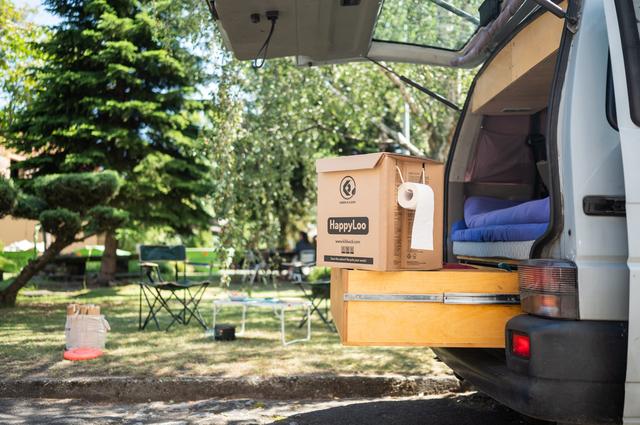Call to clean up freedom camping by ditching portapotties
The Parliamentary Commissioner for the Environment says “stop gap” efforts to clean up freedom camping have not worked, and it’s time to tighten the rules.
A report on sustainable tourism released on Thursday by commissioner Simon Upton describes freedom camping as one of the “most visibly contentious” sectors of the tourism industry.
He wants standards raised so self-contained vehicles are required to have a permanently plumbed toilet, and ideally separate tanks for black and grey water, so porta-potties would no longer pass muster.
Upton said that despite millions being spent on camping facilities and education campaigns, efforts to prevent freedom campers from using their natural surroundings as a toilet and a place to wash dishes and clothes had not resolved the issue.
READ MORE: * Time for tourism to pay for its environmental damage, says commissioner * Improvised roadblock prevents freedom campers accessing reserve * Enough talk - time for action on tourism's environmental impact, says commissioner * Government cannot track use of camper van toilets, minister says * Inside loo rule for self contained camper vans and motorhomes
“The repeated sprinklings of public money designed to dampen down the problems have often had a stop-gap” feel to them with little being done to address some of the underlying problems.”
“Allowing tourists to camp in vehicles fitted out with rudimentary toilets that are unlikely to ever be used only works because New Zealanders have been forced to accept the environmental damage that inevitably results.”
Upton recommends establishing a national register of self-contained vehicles to make enforcement easier, and avoid problems with self-contained bumper stickers being bought or counterfeit copies obtained by vehicle owners lacking the necessary documentation.
He is also scathing about the fact that there is currently no government agency overseeing the certification process to ensure it is being properly applied by approved to certifiers.
The Ministry for the Environment lost that responsibility when the Freedom Camping Act was passed in 2011 because it was regarded “an ineffective and unnecessary layer of administration,” a “remarkably complacent judgement that has not been vindicated,” Upton noted.
He said a straight forward solution would be for the NZ Transport Agency Waka Kotahi, which already had oversight of vehicle testing, to take on the role.
But “for reasons that seem scarcely overwhelming” Waka Kotahi was reluctant to do so, and the other alternative was to have it done by the Ministry of Business, Innovation and Employment.
To deter rule breakers, Upton favoured amending the Freedom Camping Act to require rental vehicle companies to help collect fines, something which has occurred voluntarily in a limited way.

However, he said many overseas visitors bought their own vehicles and registering any outstanding fines against the vehicle might make it more difficult to sell vehicles before travellers left the country, providing an incentive for the penalties to be paid.
The commissioner’s recommendations have won some support from the tourism industry, and the NZ Motor Caravan Association (NZMCA) which has more than 90,000 individual members.
NZMCA chief executive Bruce Lochore said the recommendation requiring self-contained vehicles to have plumbed-in toilets was flawed.
“Ninety per cent of our members have plumbed-in toilets, but there’s 10 per cent – that’s about 5500 vehicles – with porta-potties that meet the standard fine. We have them in 9 metre buses, it’s not just in tiny little vans.
“There are some vehicles that just should not have a porta-potty, and focussing on vehicles that are inappropriate is better than getting rid of them altogether.”
Lochore said NZMCA had long been pushing for a register and the appointment of a government agency to oversee certification.
“We need a referee because there is a wide range of interpretations of the current standard.”
Tourism Industry Aotearoa chief executive Chris Roberts said the self-containment standard needed to be reviewed and he agreed Waka Kotahi was the most appropriate body to oversee certification.
It could be done as part of the vehicle warrant or registration process, and Waka Kotahi's reluctance could be overcome. “Ministers could direct it to do it.”
Spaceships Rentals chief executive James Rolleston said few of his customers were fined, with about 30 freedom camping infringements from 6231 hires in 2019, and it would help if councils issued them directly to the company within 48 hours.
Spaceships also supported an increase in the $200 fine. “This would reduce the issue significantly overnight.”
Peter Burke of Travellers Autobahn said two major credit card companies no longer permitted the blanket clause in rental agreements allowing companies to recover any debts arising from the vehicle hire, and individual charges required cardholder approval.
He said rental companies were obliged to provide the name and address of the person in charge of the vehicle at the time of the offence, and it was inappropriate to expect them to collect fines on behalf of enforcement authorities.
Tourism Minister Stuart Nash has already stated he wants vehicles with sleeping compartments but no self-contained toilets banned from freedom camping.
He said it was too early to respond in detail to the Parliamentary Commissioner for the Environment’s report, which required in-depth consideration by a number of government agencies.
But he said it showed the push for more sustainable tourism when the borders re-opened was gathering pace, and it would not be a return to pre-Covid “business as usual.”








